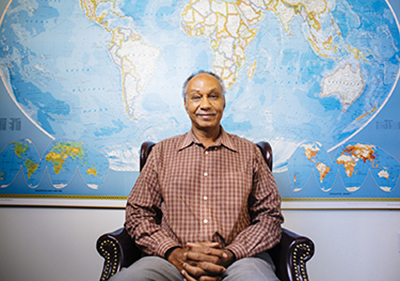Campus News
Five questions with UC Santa Cruz humanities dean Tyler Stovall
Tyler Stovall became dean of the UC Santa Cruz Humanities Division in 2015. Now beginning his second full academic year as dean, we sat down with Dean Stovall to discuss the state of the humanities at UC Santa Cruz and beyond.

Tyler Stovall became dean of the UC Santa Cruz Humanities Division in April of 2015. An expert in French history, he is currently president-elect of the American Historical Association, the largest professional organization in the country devoted to the study of history.
He was also recently featured in a Time magazine story titled “25 Moments That Changed America.”
Now beginning his second full academic year as dean, we sat down with Dean Stovall to discuss the state of the humanities at UC Santa Cruz and beyond.
Q. What were some of the highlights of your first year as dean of the humanities at UC Santa Cruz?
A. I have to say there were a number of highlights: The visit of William “Bro” Adams, chair of the NEH and UCSC History of Consciousness Ph.D., was definitely a landmark moment in highlighting the importance of the humanities to UCSC. The fact that we were able to acquire endowed faculty chairs in Literature, Jewish Studies, and Feminist Studies underscored the high renown in which our faculty and research are held in the broader community. Additionally, the tremendous outpouring of support for History’s Gail Project on Giving Day, illustrated the importance of undergraduate research in our division. Finally, our ability to bring in some excellent new staff, in particular our new assistant dean Adrienne Harrell, shows that people across campus view the Humanities Division as a good place to work.
Q. What can we expect in the coming year? Tell us about some of your future plans and goals for the division.
A. To a large extent, I wish to continue our progress with some of the initiatives from this past year, in particular working with our Institute for Humanities Research. I want to continue the work of making Humanities more visible, not just at UCSC, but throughout the broader Santa Cruz community. We will continue our very successful “Questions That Matter” series looking at how humanistic themes inform contemporary issues. We are also, along with the Graduate Division, working on an NEH planning grant to provide support and training for humanities Ph.D.s who wish to pursue careers outside academia. I am also looking forward to bringing new faculty into the division, especially in History of Consciousness and Critical Race and Ethnic Studies.
Q. Let’s talk about your research. What are you currently working on?
A. My major project is a large study of the intersections of ideas of freedom and race in modern history, primarily in America and France but on a global scale. I’m interested in exploring the ways in which our ideas of freedom are racially coded. I’m also working on a smaller project, a spin-off of my textbook Transnational France, which will consist of a series of focused essays on French history in world perspective.
Q. You were recently asked by Time magazine to choose a pivotal moment in the last 50 years of our nation’s history. As a historian, what is your take on the world right now in 2016? Do you think this year will be seen in retrospect as a pivotal moment in our country’s history?
A. It’s of course hard to say what future perspectives will be, but I think both the victory of Brexit in the United Kingdom, and the success of Donald Trump’s campaign for president, highlight the importance of globalization as well as immigration and racial difference in the contemporary era. It is paradoxical that those who have benefited most from a globalized economy have often trumpeted the values of diversity, while those who have suffered from free trade and globalization in countries like the U.S. and UK often point to immigration as a major problem. Constructing a new vision, and practices, of globalization that both promote diversity and at the same time protect the victims of globalized economics is the primary political need of our time.
Q. What role do you think the humanities can have in helping to solve some of the world’s most pressing problems of the day?
A. Historians like to say there is nothing new under the sun, and an awareness of the ways in which humanity has faced similar problems in the past is crucial to being able to overcome them. The work of humanists in understanding and learning to articulate differences of all kinds helps us confront the world as it is, in all its messiness, rather than retreating into self-contained models of society. Above all, our understanding that the pressing problems of the day are deeply political, and can only be addressed as such, is the only way ultimately to solve those problems.